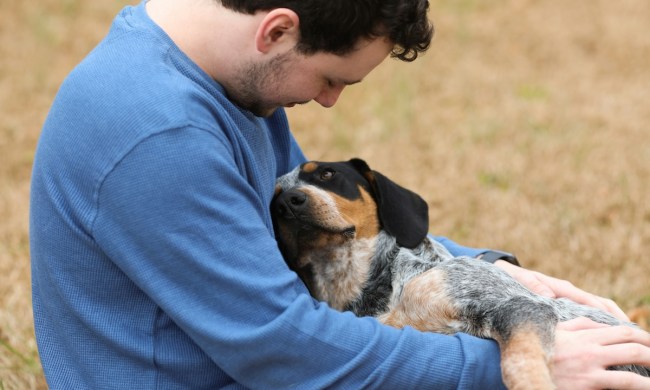As we head into cold and flu season, many of us are taking extra precautions to bump up our immunity, especially given the current times we are living in. But while it’s important to prioritize our own health, we have to keep in mind that dogs and cats can also contract colds, flu, and other viruses during this time of year.
Granted, dogs and cats don’t catch the same colds and viruses that humans do, but they each have their own set of illnesses that you’ll want to protect them from to keep them as safe and healthy as possible. PawTracks talked to Dr. Katie Kangas, DVM and integrative veterinarian, and she gave us quite a bit of insight into what cold and flu symptoms to look out for in your furry friend in addition to how you can help strengthen their immune system so that as the season approaches, they’re as protected as possible. Let’s start with an overview of the types of illnesses that affect dogs and cats.

Colds and viruses in dogs
One of the most common illnesses you’ve probably heard about in dogs is kennel cough. What you might not know is that kennel cough is not any more prevalent during cold and flu season months than in other months of the year. Dr. Katie explains, “The main agent in kennel cough, bordetella is actually a bacteria, not a virus. The kennel cough infection is a respiratory complex that has the bacterial component of bordetella, but a viral component as well.” Dogs are much more likely to get kennel cough when they are confined and have exposure to other animals.
If your dog has kennel cough, you’ll recognize it by a honking, gagging cough sound. While you might immediately become nervous and alarmed if you suspect kennel cough, Dr. Katie notes that it’s usually not a major cause for concern, saying, “For the majority of dogs, it’s a self-limiting and annoying but highly contagious issue that does not require treatment, though some vets over-treat it with antibiotics. It lasts 1 to 3 weeks, and you can mitigate the cough with herbal syrups and liquid formulas that help to soothe the airways and inflammation.”
She adds, “If dogs get lethargic or have a fever, nasal or ocular discharge, seek medical attention. If your dog does have kennel cough, keep them away from other dogs and be a responsible pet owner.”
Another illness that’s emerging in dogs is canine influenza. Dr. Katie says it’s “a true viral flu that may go up in the winter,” though she adds that she can’t speak to that clinically.” She also notes that dogs are more susceptible to canine influenza if they are boarding, going to daycare, or are show dogs.
In terms of vaccines for kennel cough and canine influenza, Dr. Katie advises not excessively vaccinating pets, as she believes it can further challenge their immune systems. She also adds that it’s not recommended for healthy dogs who are not immunocompromised to receive the canine influenza vaccine.

Colds and viruses in cats
Dr. Katie explains that there are a compilation of viruses that affect cats most when they are stressed or confined. Many kittens coming out of shelters and adoption centers are most prone to these illnesses because they are so stressed. During cold and flu season, one virus in particular that cats tend to get is a complex herpes virus called feline rhinotracheitis. It causes an upper respiratory infection in cats and can also lead to conjunctivitis (pink eye).
Dr. Katie notes that their feline herpes is similar to how the herpes virus occurs in humans, saying, “The body can harbor it and it can resurface, just like when humans get cold sores. It can resurface during times of stress.” She adds, “Sometimes when a cat comes out of the shelter, they will go for months or years without it. Then they break out with another episode when there’s a change at home. Maybe people move to a new household, bring in a new pet, or a new baby, and that can trigger an outbreak. Anything that is stressful to cats because they are so territorial presents a prime time to break out with an infection.”
Preventative measures you can take to keep your pet healthy
Nutrition is key
First and foremost, Dr. Katie advises that you need to be mindful of what you’re feeding your pet. She says, “Food is the most important preventive medicine to keep your pet in a resilient health state. It set the stage for the immune system and the body to be at a state of its highest capacity.”
If you’re feeding your pet dry kibble, you might want to rethink that choice. Dr. Katie explains, “There are so many options that are better than standard kibble. With kibble, the food is heavily heated and the nutrients are not viable. Look for less-processed, low-processed, or fresh food. Dehydrated, freeze-dried, and fresh-cooked foods are always preferable.
Supplements
She also recommends different supplements to help boost your pet’s immunity. One supplement in particular that she suggests for both dogs and cats is colostrum. She explains, “Colostrum is the very first nutrient-rich milk that comes out of a mother, which gives a baby their initial immune system until they can develop their own immunity. It’s so helpful for humans and also pets in giving the same antibody and immunosupportive factors. It’s also known to help heal the gut.”
Dr. Katie also recommends the following supplements to support your pet’s immune system:
Animal Essentials Super Immune
Pet WellBeing Immune Support for Dogs
Pet WellBeing Immune Support for Cats
Pet WellBeing Throat Gold for Dogs
Pet WellBeing Lung Gold for Cats
Keep pets’ stress low
Believe it or not, cats and dogs can actually feel and sense when their humans are stressed out, and Dr. Katie advises limiting their stress as much as possible to keep them healthy. She notes, “Pets feel their humans’ stress, too. They have more illnesses when their humans are highly stressed. By mitigating our own stress, it helps our pets as well.”
In conclusion
Having your furry friend come down with an illness might not be totally unavoidable, but it’s a relief to know that there are preventative measures you can take to set them up for having a healthy immune system as winter approaches. By giving them a strong nutritional foundation at home combined with their regular veterinary checkups, you can rest assured that you’re taking all the right steps to keeping your pet healthy and safe.



